人教版-英语-八上-5单元 Can you come to my party 配套教案)
人教版英语八年级上册Unit 9《Can you come to my party》教学设计

人教版英语八年级上册Unit 9《Can you come to my party》教学设计一. 教材分析人教版英语八年级上册Unit 9主要讲述了关于邀请别人参加聚会的情境。
通过本单元的学习,学生能够掌握与聚会相关的词汇和表达方式,学会如何礼貌地邀请别人,并能够用英语进行简单的交流。
本单元的核心句型是“Can you come to my party?”,以及回答“Yes, I can.”和“No, I can’t.”。
二. 学情分析八年级的学生已经具备了一定的英语基础,能够听懂并运用简单的英语进行交流。
他们对学习英语有浓厚的兴趣,并且愿意积极参与课堂活动。
然而,部分学生可能在口语表达和听力方面还存在一定的困难,需要教师的引导和帮助。
三. 教学目标1.知识目标:学生能够掌握与聚会相关的词汇和表达方式,学会如何礼貌地邀请别人,并能够用英语进行简单的交流。
2.能力目标:学生能够听懂并运用核心句型“Can you come to my party?”进行交流,提高口语表达能力。
3.情感目标:学生能够在课堂上积极参与,培养合作意识和团队精神。
四. 教学重难点1.重点:学生能够听懂并运用核心句型“Can you come to my party?”进行交流。
2.难点:学生能够正确使用情态动词“can”来表达自己的能力。
五. 教学方法1.情境教学法:通过创设真实的聚会情境,激发学生的学习兴趣,提高他们的口语表达能力。
2.交际法:通过小组讨论和角色扮演等方式,培养学生的合作意识和团队精神。
3.任务型教学法:通过完成各种任务,引导学生主动参与学习过程,提高他们的自主学习能力。
六. 教学准备1.教学材料:教材、多媒体课件、录音机、磁带或音频文件。
2.教学环境:教室布置成聚会场景,悬挂气球、彩带等装饰物。
七. 教学过程1.导入(5分钟)教师以提问的方式引导学生回顾已学过的与聚会相关的词汇,如“birthday party”、“house party”等。
人教版八年级英语上册5-12单元知识点(词汇+句型+固定搭配)
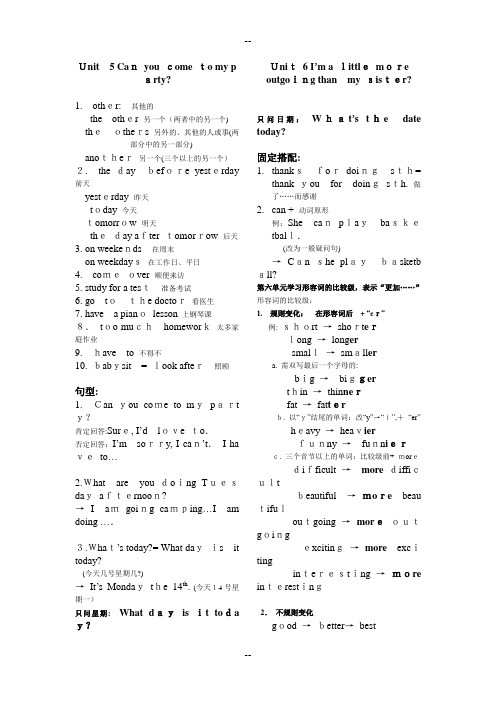
Unit 5 Canyou come to my party?Unit 6 I’m a littlemore outgoing than my sister?1.other:其他的the other 另一个(两者中的另一个)theothers 另外的、其他的人或事(两部分中的另一部分)another另一个(三个以上的另一个)2.the daybefore yesterday 前天yesterday 昨天today 今天tomorrow 明天theday after tomorrow 后天3. on weekends在周末on weekdays在工作日、平日4.comeover 顺便来访5. study for a test准备考试6. go tothe doctor看医生7. have a pianolesson上钢琴课8.too muchhomework太多家庭作业9.have to 不得不10. babysit= look after照顾句型:1.Can you come to mypart y?肯定回答:Sure, I’d love to.否定回答:I’m sorry, I can’t.I ha veto…2.What are you doing Tuesdayafternoon?→I amgoing camping…I am doing ….3.What’s today?= What dayis it today?(今天几号星期几?)→It’s Mondaythe 14th.(今天14号星期一)只问星期:What dayis it toda y?只问日期:What’s the date today?固定搭配:1.thanksfordoingsth=thank you for doingsth. 做了……而感谢2.can + 动词原形例:She canplaybasketball.(改为一般疑问句)→Can she playbasketb all?第六单元学习形容词的比较级,表示“更加……”形容词的比较级:1.规则变化:在形容词后+ “er”例: short →short erlong →long ersmall→small era. 需双写最后一个字母的:big →biggerthin →thin nerfat →fat terb. 以“y”结尾的单词:改“y”→“i”,+“er”heavy →heavierfunny →funn ierc. 三个音节以上的单词:比较级前+ moredifficult →more difficultbeautiful→more beau tifuloutgoing →moreoutgoingexciting→more excitinginteresting →more interesting2.不规则变化good →better→bestbad→worse→worst词汇:1.than比2. as 如同…一样the same as 与……一样as +形+ as:与……相比一样notas +形+ as与…相比不如…= not so + 形+as与…相比不如…3. both 两者都例:they both=bothofthem 他们两个4. have something in common 有共同点5. be goodatdoing sth=dowell in doing sth擅长于做…事句型:1.Tina isshorter than Tara.2.Tinais more athletic thanTara.3.She isa little more outgoingthanme.她比我更外向一点点。
八年级上册英语Unit5-can-you-come-to-my-party知识点总结
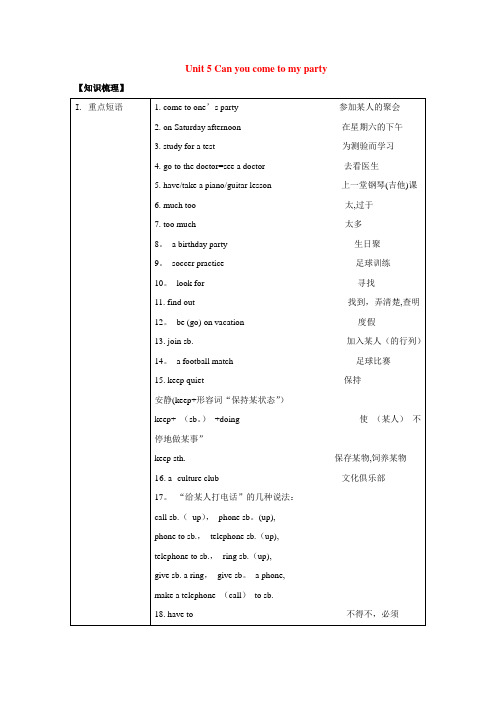
Unit 5 Can you come to my party【知识梳理】I. 重点短语 1. come to one’s party 参加某人的聚会2. on Saturday afternoon 在星期六的下午3. study for a test 为测验而学习4. go to the doctor=see a doctor 去看医生5. have/take a piano/guitar lesson 上一堂钢琴(吉他)课6. much too 太,过于7. too much 太多8。
a birthday party 生日聚9。
soccer practice 足球训练10。
look for 寻找11. find out 找到,弄清楚,查明12。
be (go) on vacation 度假13. join sb. 加入某人(的行列)14。
a football match 足球比赛15. keep quiet 保持安静(keep+形容词“保持某状态”)keep+ (sb。
)+doing 使(某人)不停地做某事”keep sth. 保存某物,饲养某物16. a culture club 文化俱乐部17。
“给某人打电话”的几种说法:call sb.(up),phone sb。
(up),phone to sb.,telephone sb.(up),telephone to sb.,ring sb.(up),give sb. a ring,give sb。
a phone,make a telephone (call)to sb.18. have to 不得不,必须19。
the day after tomorrow 后天20。
a science report 科学报告II. 重要句型邀请用语1. Can you come to my party?= Would you like to come to my party?肯定回答:Sure,I’d love to。
八年级英语上册 Unit 5《Can you come to my party》教案 人教新目标版

Unit 5 Can you come to my party?I. Analysis of the Teaching Material1.Status and FunctionThe topic of this unit is about invitation. It teaches the students how to give or receive an invitation. It’s close to the everyday life. So we’d better raise the students learning interest first.2.Teaching aids and demands(1)Knowledge ObjectsStudents must learn to make invitation. They must learn to say yes and say no to aninvitation and give their reasons.(2)Ability ObjectsTo improve the students’ ability of listening, speaking, reading, writing.(3)Moral ObjectsWe teach this lesson in order to learn how to accept or refuse an invitation of foreigncountries politely. It will teach the students good manners. If he or she holds a partyat home, He or she will feel happy when they can do something for others.(4)Teaching Key PointsThe key vocabulary and the key phrases of this unit(5)Teaching DifficultiesUsing the target language to improve the abilities of the studentsII. Target languageCan you come to birthday party?Yes, I’d love to.Sorry, I can’t. I have to look after my mother.When is the party?It’s at six on Monday.III. VocabularyTomorrow, weekday, invitation, match, whole, whom, another, concert, pity, free, American,Chemistry, training…IV. Learning StrategiesInductingCooperatingV. Teaching procedures.It includes five periods. (5个课时)The First PeriodI. Teaching Aims and DemandsKey vocabulary and phrasesTarget languageTo improve the students ability of Listening and speakingII. Teaching Key Points(1) Key PhrasesStudy for a test, have a piano lesson, go to the doctor, visit my aunt (2) Target language_ Can you come to my party on Sunday?_ Sure, I’d love to._ Can you come to my party on Sunday?_ Sorry, I have too much homework this weekend.I have to help my mum.I have to go to the doctor.III. Teaching DifficultiesUsing the target language to practice the oral English in pairsIV. Teaching MethodsCommunicative methodsPairworkV. Teaching Aids多媒体VI. Teaching ProceduresStep 1Before the class, let the students listen to the music, this can guide to the new lesson. Afterthis, ask thestudents to watch the movie, this can guide to the target language.Step 2 (1a)Learn the phrases and do the exercise in 1a.The answer is: b, d, a, c, eStep 3 (1b and 1c )First let the students read the dialogue in the picture. Then listen to it. (This activity provides guided oral practice using the target language). After the listening practice, ask the student to practice some invitations and refusals.Step 6 (Blackboard design)Unit 5How about…? politeWhat about…? impolite The second periodI Teaching aims and demands1. Knowledge ObjectsKey vocabularyTarget languageGrammar focus2. Ability Objects_ ListeningII. Teaching key points1. key vocabularyhey, baseball game, too much homework2. Target languageA: Hey, Dave! Can you come to the movies on Saturday? B: I’m sorry, I can’tI have too much homework.I have to help my mum.I have to go to my guitar lesson.I have to visit my aunt.III Teaching difficultiesGrammar focusIV Teaching methodsListening and speaking methods.Communicative approachPairwork.VI Teaching procedureStep IGreet the class and check the homeworkStep II (2a)First, make the preparation for listening. Read the sentences twice to the class. The first time you can read “can”, the second time you can read “can”. Then let the students listen .The answers for activity 2a are : 1. can’t , 2.can 3. can’t 4. can’t 5.canStep III (2b)Ask a student to read the sentences in the box.. Tell the students these are the reason why people can’t go to the party. Listen to the recording again and number the reasons 1~3 why they can’t go to the party .The answers are : a . 2 d . 3 e . 1Step IV (2c)This is an oral practice about the target the language . You can ask the student if they can give other reasons besides the ones in 2a . If they can, make a dialogue in pair . ( First , ask two who can do it well to make a model dialogue , then let them do it in pairs .Step V . ( Grammar focus)First , let the students read the sentences in the grammar box . Then write “ have to , has to ” on the blackboard , and tell them they are used to say no to an invitatio n . And then write “ be going to do something ” on the blackboard , tell the students we can say no to an invitation by talking about the future plan . After that , let them do exercises in order to master to the grammar .Step V. Blackboard designUnit 51. have to /has to + verbThey have to go to the acting lesson on Sunday.Lucy has to help her mom with the housework.Do they have to go to the acting lesson on Sunday.Yes, they do. / No, they don’t.Does Lucy have to help her mom with the housework?Yes, she does. / No, she doesn’t.2. Can you come to…? Sure, I’d love to. / Sorry, I can’t. I haveto…Can she come to…? No, she can’t. She has to…Step VI . HomeworkPlease write as many reasons as you can to refuse an invitationThe Third PeriodI Teaching aims and demands1. Vocabulary and phrases Oral practice2. Ability objectsReading, writing, communicative competenceII. Teaching key PointsReview vocabulary items and grammar focusIII. Teaching difficultyOral practice using the target languageI. Teaching methodsReading, writing methods and communicative approachV. Teaching proceduresA computerVI. Teaching proceduresStep IGreet the class and let a student to make a duty report. And then check the homeworkStep II (3a writing)Show the invitation in 3a to the students. Ask the students to fill in the blanks according to the information of the invitation.The answers are: can, party, when, on Friday, June 30 4:30Step III (oral practice)Practice the dialogue in 3a in pairs and then let some of the act the dialogue.Step IV (writing)Let the students fill in the card with details of an event. Then call your friends and invite them to the event.Step V Invite a friend (oral practice)Tell the students how to do the activity: Student A, you are Eliza. Look at page 82. Eliza , invite Lu Qing to go to the mall . Look at the calendar for this week and find a time when you can both go there.Use the dialogue in the box to start the activity , and then ask more questions to learn when both people aren’t busy . Help students to start the work, give them a hand if needed.The answers: Lu Qing and Eliza are both free on Wednesday afternoon , Friday afternoon , Saturday and SundayStep VI. SummaryToday we have learnt how to write an invitation and done a lot of practice.Step VII HomeworkGive your best friend an invitation to an event.The student who receives it must give a reply.Step III . Blackboard designUnit 51. Lu Qing and Eliza are both Free on :2. have fun /have a great timeWednesday afternoon 3. join/take part inFriday afternoon 4. have a piano lessonSaturday have a swimSunday have a lookThe Fourth Period I. Teaching aims and demands.Target languageOral practiceII. Ability objects.Listening skillSpeaking skillCommunicative competenceIII. Teaching key points1.Key vocabulary.Sunday, Monday, Tuesday, Wednesday, Thursday, Friday, Saturday Yesterday, today, tomorrow, the day after tomorrow2.Target language.What’s today?It’s Monday the 14th.Can you play tennis with me?When?Today.Sorry, I can’t.IV. Teaching difficulties.The target languageV. Teaching methods.Listening and speaking methods.VI. Teaching aids.A calendarA computerVII. Teaching procedure.Step 1Greet the class and check the homework.Step 2 (Section B 1a)Show the students a calendar, and ask a student to point out today’s date. Point to the number which shows the dates, and ask the students to copy them into the calendar in their book.Read the dates and let the students read after you.Step III (1b)1.Show the words on the screen:Yesterday, today, tomorrow, the day after tomorrow, weekday2.Let the students write the words below the correct days on the calendar in 1a.Step IV (1c)First ask two students to read the dialogue in the box. Then let them practice it in pairs by using the calendar in 1a.Step IX Blackboard designThe Fifth period I. Teaching aims and demands.1. Knowledge objectsE-mail messageWriting practiceReading practice2Ability objectsReading and writing skillCommunicative competenceII. Teaching key pointsReading passage主语+verb+-ing I have to…III. Teaching difficultiesReading and wring practice.IV. Teaching methodsReading and writing methods and communicative approach.V. Teaching aidsA calendarVI. Teaching proceduresStep 1Greet the class, do the duty report.Step 2 (3a )First, read the e-mail message to the students. Ask the students if they have any questions.If they do, answer them. Then let the students fill in the calendar on the book. After this, explain the key language points to them.Language points:1. Thank you for… (为……表示感谢)Thank you for helping me.Thank you for your invitation.2On ( 在某天,在某天的上午、下午或晚上)I’m going to the dentist on Sunday.Unit 5Sunday, Monday, Tuesday, Wednesday, Thursday, Friday, Saturday The____ the_____ the_____ the______ the_____ the____ the_____ Yesterday, today, tomorrow, the day after tomorrowOn Friday afternoon, I often play soccer.The answers to the calendar are:SundayMonday Cousin’s birthday partyTuesday Go to the dentistWednesdayThursday Tennis trainingFriday Study for the chemistry testSaturday Go to the moviesStep 3 (3b)First, tell the students when we talk about our future plans, we often use: I’m+verb+ing When we talk about what we must do, we use have to.Ask the students to fill in the blanks in 3b.The answers are: shopping, go to see, a test, I’m going, my family.Step 4 (3c)Let the students write an e-mail message to a friend. Say why you can’t visit next.Before the exercise, ask the students to give some possible answers and write them on the blackboard. So the students will feel easy to finish the writing exercise. After they finish it, Let them to correct it in groups first. Each group chooses theirs best one to read in front of the whole class.Step 5 ( planning a party )First read the conversation in the box together. Then ask the students to turn to page 88. Write down everything you have to do next week. Write in all the things you have to do .Ask the students to look at the list. Ask them “What day are you free?” This is when you can have your party.Step 6 (Self check 1 )Let the students to fill in the blanks with the words given. Change the forms of the words if possible. Then make their own sentences. The answers are: visit, playing, have to, study, comeStep 7 (Self check 2)Imagine you are Marie. Read the information and look at your schedule. Write replies to the invitation.VII. Summary and homeworkToday we have learnt how to write a e-mail to a friend. You can write another one to your frien after class.Step 8 Blackboard designUnit 51. Thanks for…2. on Sunday at 4:00Thanks for helping me. I’m going to the dentist on Sunday.Thanks for your invitation. I often get up at 4:00.。
人教版英语初二上5-8单元知识点及练习题

Unit 5 Can you come to my party?知识点提纲:another/other/others/the other/the others;thank you for;who/whom; Study for...;Keep用法;have to/must/其他情态动词的用法比较;【重要词组】baseball game棒球比赛the day after tomorrow 后天come over to 从一地方来到另一个地方,过来go to the doctor 去看病 have a piano lesson上钢琴课have to 不得不 next time 下一次study for a test 准备考试 be free 有空儿,有时间【部分词汇用法】1、do my lessons做功课have a lesson / have lessons (学生)上课:give a lesson to sb. / give lessons to sb. (老师)给某人上课:give sb. a lesson给某人一个教训:The illness taught him a lesson, so he wanted to exercise every day.2、another作形容词:I am still hungry. I want to have another apple.作代词: I don’t like this shirt. I want to have a look at (看)another. from one to another 从一个到另一个:I’m going hiking from one city to another.3、other/ others/another/the other/the othersother 作形容词或代词,做形容词时,意思是“别的,其他”,泛指“其他的(人或物)”。
八年级上册英语第五单元知识点指导:Can you come to my party-

八年级上册英语第五单元知识点指导:Can you come to my party?
1. play tennis with me 和我一起打网球
2. I have a really busy week 我一周很忙
3. football match足球比赛
4. my cousins birthday party 我表弟的生日聚会
5. write soon尽快回信
6. study for my science test 为科学考试而学习
7. 给某人打电话的几种说法:
call sb. up,call sb.phone sb.telephone sb.
telephone to sb.phone sb. Upring sb.
give sb. a ring,give sb. a phonemake a telephone call to sb.
8. on Thursday night 星期四晚上
9. be (go) on vacation 度假
10. next week下周
精品小编为大家提供的八年级上册英语第五单元知识点,大家仔细阅读了吗?最后祝同学们学习进步。
初二上册英语四单元知识点指导:How do you get to
school?
新学期八年级英语上册第四单元知识点讲解。
八年级英语上册 Unit 5 Can you come to my party 人教新目标版
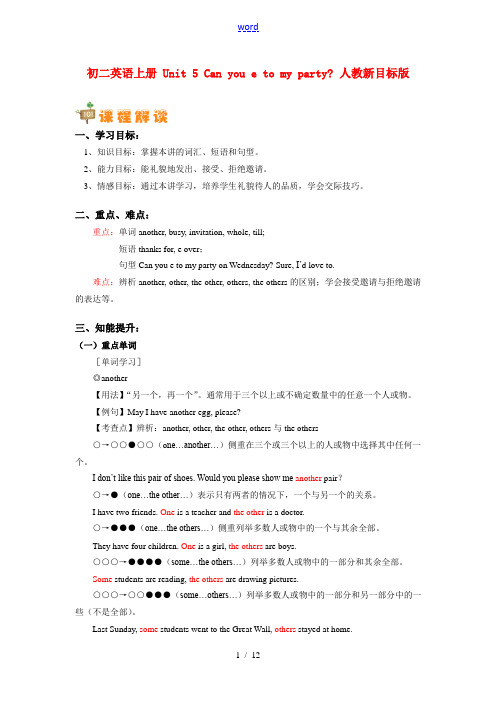
初二英语上册 Unit 5 Can you e to my party? 人教新目标版一、学习目标:1、知识目标:掌握本讲的词汇、短语和句型。
2、能力目标:能礼貌地发出、接受、拒绝邀请。
3、情感目标:通过本讲学习,培养学生礼貌待人的品质,学会交际技巧。
二、重点、难点:重点:单词another, busy, invitation, whole, till;短语thanks for, e over;句型Can you e to my party on Wednesday? Sure, I’d love to.难点:辨析another, other, the other, others, the others的区别;学会接受邀请与拒绝邀请的表达等。
三、知能提升:(一)重点单词[单词学习]◎another【用法】“另一个,再一个”。
通常用于三个以上或不确定数量中的任意一个人或物。
【例句】May I have another egg, please?【考查点】辨析:another, other, the other, others与the others○→○○●○○(o ne…another…)侧重在三个或三个以上的人或物中选择其中任何一个。
I don’t like this pair of shoes. Would you please show me another pair?○→●(one…the other…)表示只有两者的情况下,一个与另一个的关系。
I have two friends. One is a teacher and the other is a doctor.○→●●●(one…the others…)侧重列举多数人或物中的一个与其余全部。
They have four children. One is a girl, the others are boys.○○○→●●●●(some…the others…)列举多数人或物中的一部分和其余全部。
八年级英语集体备课教案Unit-5-Can-you-come-to-my-party教案
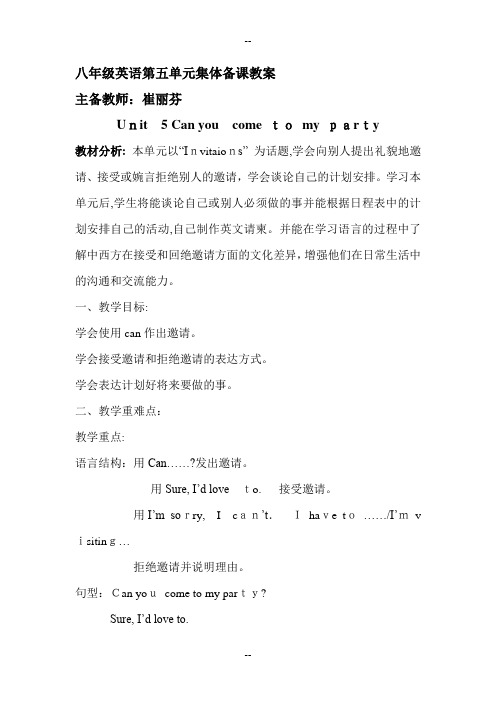
八年级英语第五单元集体备课教案主备教师:崔丽芬Unit 5 Can you come tomy party教材分析: 本单元以“Invitaions” 为话题,学会向别人提出礼貌地邀请、接受或婉言拒绝别人的邀请,学会谈论自己的计划安排。
学习本单元后,学生将能谈论自己或别人必须做的事并能根据日程表中的计划安排自己的活动,自己制作英文请柬。
并能在学习语言的过程中了解中西方在接受和回绝邀请方面的文化差异,增强他们在日常生活中的沟通和交流能力。
一、教学目标:学会使用can作出邀请。
学会接受邀请和拒绝邀请的表达方式。
学会表达计划好将来要做的事。
二、教学重难点:教学重点:语言结构:用Can……?发出邀请。
用Sure, I’d loveto. 接受邀请。
用I’m sorry,I can’t.Ihave to……/I’mv isiting…拒绝邀请并说明理由。
句型:Can youcome to my party?Sure, I’d love to.I’m sorry, I can’t. I have to ……教学难点;1. 使用Can……?发出邀请。
2. 使用Ihave to ……句型说明原因。
3.进行时表示未来计划。
三、情感、态度与价值观培养学生使用礼貌用语的能力,营造积极乐观的人际氛围,增进人与人之间的友谊,学会坦诚的与人相处,用英语交谈,培养交际能力,激发学生的主动性,激励学生自主学习。
四、课时设计:(5课时)Period 1: SectionA: 1a-2cPeriod2: SectionA: 3a-part4Period 3:Section B:1a-2c and part4Period 4: Section B: 3a-3cPeriod5:Revision and Selfcheck五、教学活动设计:本单元围绕“邀请和请求许可”这一话题,设计了三个任务型活动:Task1:对话展现提出邀请和接受邀请及拒绝邀请的英文表达。
人教版八年级英语上册第五单元教材全解
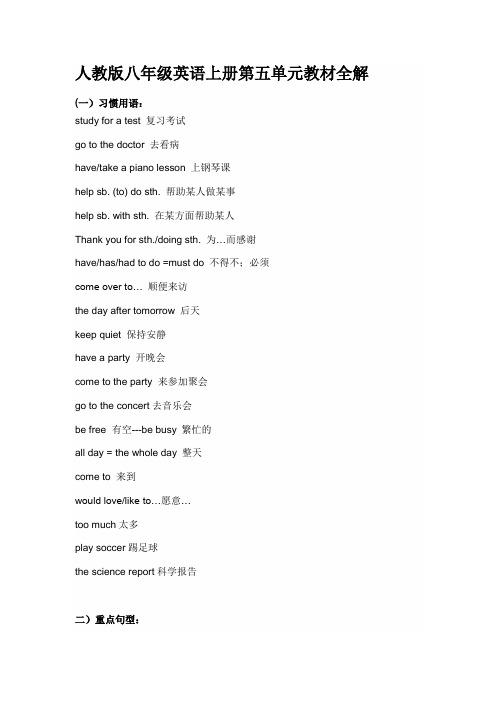
人教版八年级英语上册第五单元教材全解(一)习惯用语:study for a test 复习考试go to the doctor 去看病have/take a piano lesson 上钢琴课help sb. (to) do sth. 帮助某人做某事help sb. with sth. 在某方面帮助某人Thank you for sth./doing sth. 为…而感谢have/has/had to do =must do 不得不;必须come over to… 顺便来访the day after tomorrow 后天keep quiet 保持安静have a party 开晚会come to the party 来参加聚会go to the concert去音乐会be free 有空---be busy 繁忙的all day = the whole day 整天come to 来到would love/like to…愿意…too much太多play soccer踢足球the science report科学报告二)重点句型:1.Can you come to my party on Wednesday? 你星期三能来参加我的晚会吗? 2.Sorry.I can't.I have a piano lesson. 对不起,我不能。
我要上钢琴课。
3.Sure.I'd love to.当然,我愿意。
4.I'm playing soccer.我在踢足球。
5.I have too much homework(to do) this weekend .这个周末我有太多家庭作业(要做)。
6.I have to go to the doctor.我得去看医生。
7.I can't join you because I have to help my mom.我不能参加,因为我要帮我妈妈干活。
人教版初二八年级英语上册 Unit 5 Can you come to my party 4 PPT课件

Read the conversations and then show the conversations
If you can’t go to the party, what shorry, I can’t. I have to …
I’m sorry, I can’t. I’m doing …
Listen, and write the names.
Tim, Ted, Kay, Anna, and Wilson
Tim Kay Anna Ted Wilson
Turn to page 87 , read the listening material. Then find the difficulties.
Can she come to my birthday party?
No, she can’t. She has to study for a test.
思考探究
• • • • • 1. have to 的用法:用have to 的适当形式填空: ① I_____ ______ go to the doctor. ② He _____ _____to play the basketball. ③You ______(not have)to worry about it. ④. Yesterday he _____ _____ go to the dentist, because he had a toothache. 归纳总结:have to 和其它的情态动词是否一样?它有无人称和数的 变化? _______________________________________________________ have to 的否定式是什么? ___________________________________ have to 后面跟什么成分? ___________________________________ 2.归纳总结: How to give reasons to say no to an invitation?请举两个例子: _______________________________________________ ________________________________________________
2019-2020年八年级英语上册 Unit5 Can you come to my party复习
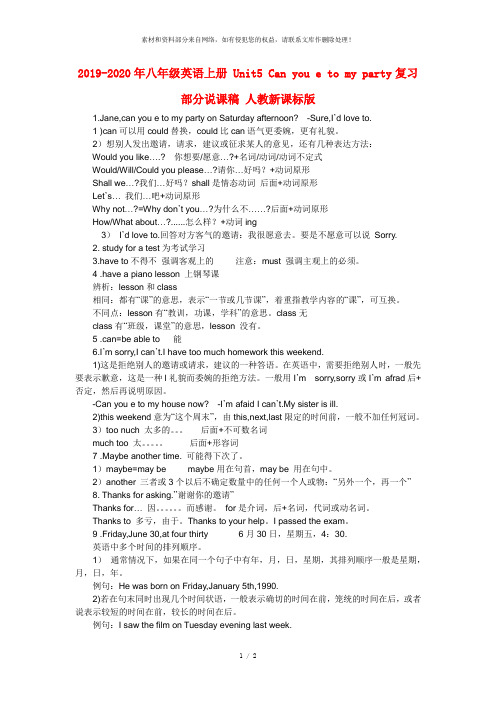
2019-2020年八年级英语上册 Unit5 Can you e to my party复习部分说课稿人教新课标版1.Jane,can you e to my party on Saturday afternoon? -Sure,I’d love to.1 )can可以用could替换,could比can语气更委婉,更有礼貌。
2)想别人发出邀请,请求,建议或征求某人的意见,还有几种表达方法:Would you like….? 你想要/愿意…?+名词/动词/动词不定式Would/Will/Could you please…?请你…好吗?+动词原形Shall we…?我们…好吗?shall是情态动词后面+动词原形Let’s…我们…吧+动词原形Why not…?=Why don’t you…?为什么不……?后面+动词原形How/What about…?......怎么样?+动词ing3)I’d love to.回答对方客气的邀请:我很愿意去。
要是不愿意可以说Sorry.2. study for a test为考试学习3.have to不得不强调客观上的注意:must 强调主观上的必须。
4 .have a piano lesson 上钢琴课辨析:lesson和class相同:都有“课”的意思,表示“一节或几节课”,着重指教学内容的“课”,可互换。
不同点:lesson有“教训,功课,学科”的意思。
class无class有“班级,课堂”的意思,lesson 没有。
5 .can=be able to 能6.I’m sorry,I can’t.I have too much homework this weekend.1)这是拒绝别人的邀请或请求,建议的一种答语。
在英语中,需要拒绝别人时,一般先要表示歉意,这是一种l礼貌而委婉的拒绝方法。
一般用I’m sorry,sorry或I’m afrad后+否定,然后再说明原因。
八年级英语上册Can-you-come-to-my-party知识点整理
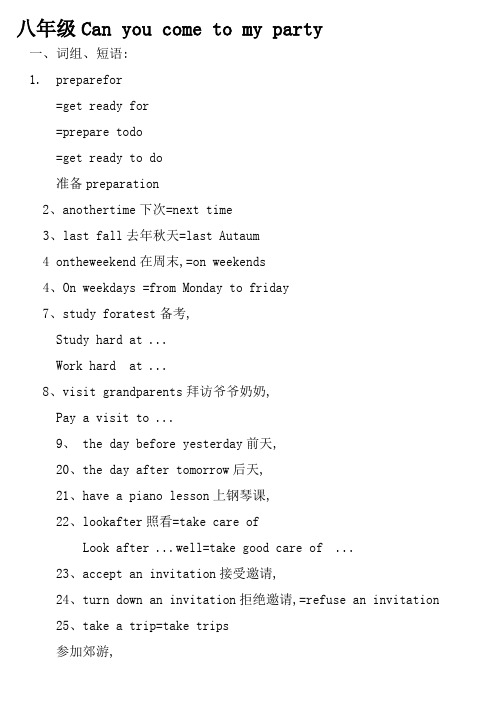
八年级Can you come to my party一、词组、短语:1. preparefor=get ready for=prepare todo=get ready to do准备preparation2、anothertime下次=next time3、last fall去年秋天=last Autaum4 ontheweekend在周末,=on weekends4、On weekdays =from Monday to friday7、study foratest备考,Study hard at ...Work hard at ...8、visit grandparents拜访爷爷奶奶,Pay a visit to ...9、 the day before yesterday前天,20、the day after tomorrow后天,21、have a piano lesson上钢琴课,22、lookafter照看=take care ofLook after ...well=take good care of ...23、accept an invitation接受邀请,24、turn down an invitation拒绝邀请,=refuse an invitation25、take a trip=take trips参加郊游,26、lookforwardto=expect期望/渴望,28、the opening of…开幕/开业,29、reply in writing以回信方式回复Replay in writing to sbreply回答,指用口头或书面形式回答,不及物动词replytosb/sth.对…..作出回答。
作及物动词,意为回答,回答说。
作名词,意为:答道,回信,答复,后跟介词to.30.do one’s homework做作业,Doesn’t do /don’t do/ didn’t do one’s homework32、not…until不…直到才=not... before =after31、I dont read books until she comes back32、I dont read books before she comes back33、I read books after she comes back34、Invite sb to some place35、invite sb.to d osth.邀请某人做某事36、Invitation37、hangout闲逛,39.seesbtodosth/seesbdoingsth看见某人做某事,40.the best way to do sth.做某事的最好方法,The best way of doing sth41.lookforwardtodoingsth.期望做某事=expect to do42、replytosth/sb.回答某人/回答某事,38、hangout常去某处,泡在某处,hangabout闲荡,hangup 挂电话,悬挂,挂起40.catchyou=seeyou=byebye,39、catchacold感冒,40、catchsb’seye引起某人注意,41、catchthetrain赶上火车catchupwith=keepupwith赶上,跟上,42、catchholdof=takeholdof抓住43、the early bird catches the worms44、Catch you on Monday45、Take turns to do sthturndown=refuse拒绝turnup放大,调高turnover翻身taketurns依次,轮流46、helpsb.dosth帮助某人做某事helpsb.withsth在某方面帮助人helponeselftosth随便吃47、Can’t help to do48、Can’t help doing50.at the end of在…末尾,在…尽头,in the end最后=finallly=at last终于51. lookforwardto 期待,盼望,to是介词,后跟名词,代词或动名词作宾语。
八年级英语上册 Unit 5 Can you come to my party教材全梳理 人教新目标
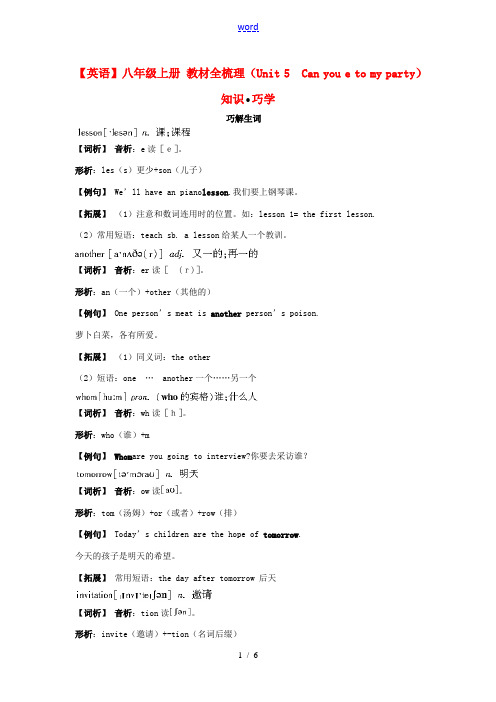
【英语】八年级上册教材全梳理(Unit 5 Can you e to my party)知识•巧学巧解生词【词析】音析:e读[e]。
形析:les(s)更少+son(儿子)【例句】We’ll have an piano lesson.我们要上钢琴课。
【拓展】(1)注意和数词连用时的位置。
如:lesson 1= the first lesson.(2)常用短语:teach sb. a lesson给某人一个教训。
【词析】音析:er读[(r)]。
形析:an(一个)+other(其他的)【例句】One person’s meat is another person’s poison.萝卜白菜,各有所爱。
【拓展】(1)同义词:the other(2)短语:one…another一个……另一个【词析】音析:wh读[h]。
形析:who(谁)+m【例句】 Whom are you going to interview?你要去采访谁?【词析】音析:ow读。
形析:tom(汤姆)+or(或者)+row(排)【例句】Today’s children are the hope of tomorrow.今天的孩子是明天的希望。
【拓展】常用短语:the day after tomorrow 后天【词析】音析:tion读。
形析:invite(邀请)+-tion(名词后缀)【例句】 Thanks for your invitation! 谢谢你的邀请!【拓展】(1)同根词:invite(2)常用短语:a letter of invitation 一封邀请信【词析】音析:i读[I]。
形析:形近词city【例句】It’s a pity that you did not e.很遗憾你没来。
【拓展】(1)惯用法:What a pity!真遗憾!(2)短语:feel pity for sb. 同情某人;out of pity出于同情【词析】音析:o读。
人教版八年级上册英语第五单元说课稿

初中英语说课稿范例《Unit 5 Section A 1a-Grammar Focus》尊敬的各位领导老师:大家好!今天我说课的内容是八年级上册第五单元Can you come to my party? Section A 1a---2c.我准备从以下几个方面来谈一谈我对这一课的安排:一、教材分析(教学内容、教学目标、教学重点、教学难点);二、教学过程(教学方法、教学手段、活动设计、设计意图);三、教学反思。
一、教材分析:1、教材内容:本单元通过“邀请”(Invitation)这一话题,介绍了提出邀请、接受邀请以及如何有礼貌的接受拒绝的交际用语。
中间穿插了情态动词can, have to 的用法。
而本课是一节听说课,重点在于培养学生的听说能力。
特别要求学生学会在请求别人做某事时使用礼貌用语。
2、教学目标:知识目标:通过本单元的学习让学生掌握有关邀请和请求许可的用语,拒绝邀请及合理的解释,在互动的交流中学会谈论自己的计划安排。
能力目标:通过在真实情境中的对话操练,听力练习,游戏,培养学生动脑,动口和动手的能力,和语言在真实情境中运用的能力。
情感目标:在交际,操练和动手操作的合作学习过程中,培养同学们的合作意识,增进同学间的友谊,并培养学生礼貌的接受和合理的拒绝别人请求的意识。
3、教学重点与难点:重点:本课的重点词汇短语:study for a test, go to the doctor, have a piano lesson, help my parents, visit my aunt.以及时间短语on Saturday afternoon等。
以Can开头的一般疑问句,can和can’t 的区分,和sure, I’d love to. Sorry, I can’t, thank you for asking, maybe another time, I have to…等答语。
难点:听力技能和语言表达的训练。
人教版八年级英语教案上册Unit 5 教学设计
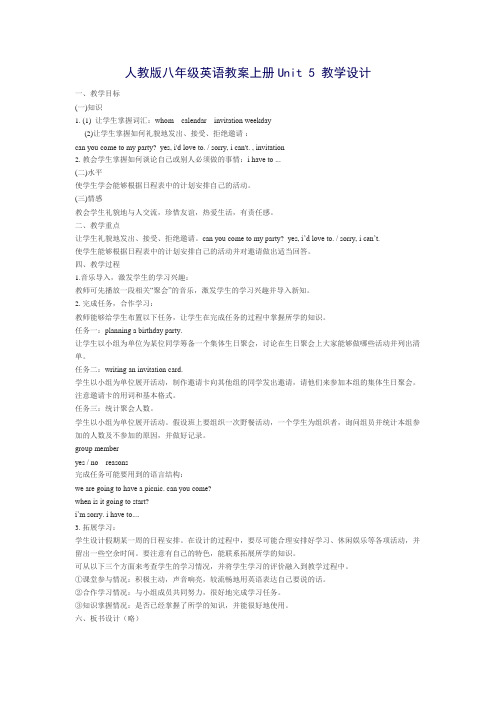
人教版八年级英语教案上册Unit 5 教学设计一、教学目标(一)知识1. (1) 让学生掌握词汇:whom calendar invitation weekday(2)让学生掌握如何礼貌地发出、接受、拒绝邀请:can you come to my party? yes, i'd love to. / sorry, i can't. , invitation2. 教会学生掌握如何谈论自己或别人必须做的事情:i have to ...(二)水平使学生学会能够根据日程表中的计划安排自己的活动。
(三)情感教会学生礼貌地与人交流,珍惜友谊,热爱生活,有责任感。
二、教学重点让学生礼貌地发出、接受、拒绝邀请。
can you come to my party? yes, i’d love to. / sorry, i can’t.使学生能够根据日程表中的计划安排自己的活动并对邀请做出适当回答。
四、教学过程1.音乐导入,激发学生的学习兴趣:教师可先播放一段相关“聚会”的音乐,激发学生的学习兴趣并导入新知。
2. 完成任务,合作学习:教师能够给学生布置以下任务,让学生在完成任务的过程中掌握所学的知识。
任务一:planning a birthday party.让学生以小组为单位为某位同学筹备一个集体生日聚会,讨论在生日聚会上大家能够做哪些活动并列出清单。
任务二:writing an invitation card.学生以小组为单位展开活动,制作邀请卡向其他组的同学发出邀请,请他们来参加本组的集体生日聚会。
注意邀请卡的用词和基本格式。
任务三:统计聚会人数。
学生以小组为单位展开活动。
假设班上要组织一次野餐活动,一个学生为组织者,询问组员并统计本组参加的人数及不参加的原因,并做好记录。
group memberyes / no reasons完成任务可能要用到的语言结构:we are going to have a picnic. can you come?when is it going to start?i’m sorry. i have to....3. 拓展学习:学生设计假期某一周的日程安排。
人教版初中英语八年级上册 U5 Can you come to my party 全单元课件

2c
B: I’m going to …
PAIRWORK
A: What are you going to do tomorrow?
A: What are you going to do the day after tomorrow?
B: Well, I’m …
3a
Read the e-mail and write.
2c PAIRWORK
For example:
A: Hey, Dave, can you go to the
movies on Saturday?
B: I’m sorry, I can’t. I have too
much homework this weekend.
A: That’s too bad. Maybe another
A: Can you come to my party? B: Sure, I'd love to.
C: Sorry, I can't. I have to…
Why can’t he/she come to the party?
She has to visit her aunt.
He has a concert.
play
2b
Listen again and match.
play
Vince’s Activities
Days
b play soccer
a ___ go to the doctor a. today b. tomorrow a ___ study for a test c. the day after b tomorrow ___ have a piano lesson
八年级英语unit 5 can you come to my party 通用版知识精讲

初二英语Unit 5 Can you come to my party? 通用版【本讲主要内容】Unit 5 Can you come to my party?通过本课的学习,我们应该能做下面的事:1. 学会礼貌地发出、接受、拒绝邀请。
2. 谈论自己或别人必须做的事情。
3. 学习根据日程表中的计划安排自己的活动。
4. 学习can及其它情态动词的用法。
【知识掌握】【知识点精析】同学们,你们的课余时光是怎样度过的呢?你都有一些什么样的课余生活呢?你有没有邀请过你的好友一起看电影、打球、听音乐会或者参加聚会呢?相信你通过第五单元的学习,一定可以用准确的英语熟练地表达你的这些想法。
【词汇用法】1. lesson n. 功课、课程We had a history lesson at school this morning. 我们今天早上在学校上了一堂历史课。
an English lesson=a lesson in English 英语课give lessons in drawing 上绘画课lesson与class的区别lesson课程(更强调上课的内容);class班级(更强调上课的环境)We have four lessons in the morning and two in the afternoon. 我们上午有4节课,下午有2节。
She was in a class of thirty students. 她在一个有30个学生的班里。
2. invitation n. 邀请I have received an invitation to their party. 我收到了他们宴会的请贴。
make invitations 发出邀请accept invitations 接受邀请decline invitations 拒绝邀请invite v. 邀请Thank you for inviting me. 谢谢你的邀请。
人教版-英语-八上-5单元 Can you come to my party

新目标英语八年级上Unit5 Section A第一课时教学设计一、教学目标:(知识目标、能力目标、德育目标)(1)知识目标:通过本节课的学习让学生掌握有关有礼貌地发出、接受和拒绝邀请以及谈论自己或别人必须做的事情。
(2)能力目标:通过在真实情境中的对话操练,听力练习,邀请比赛、电话邀请、唱生日歌以及自学探究等活动,培养学生动脑、动口和动手的能力、听的能力、语言在真实情境中运用的能力、表演能力以及归纳概括能力。
(3)德育目标:在交际,操练和自学探究、为朋友唱生日歌、邀请对方参加活动等的合作学习过程中,培养同学们的合作意识,增进同学间的友谊,并培养学生礼貌的接受和合理的拒绝别人请求的意识。
二、教学重点及难点:重点:本课的重点词汇短语:study for a test, go to the doctor, have a piano lesson,help my parents, visit my aunt.以及时间短语on Saturday 等。
以Can开头的一般疑问句和sure, I’d love to. Sorry, I can’t, thank you for asking, maybe another time, I have to…等答句。
难点:目标词汇和句型在实际情况中的运用。
三、教法、学法:任务型教学法为主体,以小组活动、两人协作为依托。
以对话操练,听力练习,邀请比赛、电话邀请、唱生日歌以及自学探究和笔头练习为载体开展教学。
四、学具准备:教学课件,电脑,为形象学会词组并进行相关联系配套的图片、电话机、无线话筒。
五、教学程序:板书:Unit5 Can you come to my party?Sure, I’d love t oCan you come to my party?I’m sorry ,I c an’t, I have to help my mom.Can he come to my party? No, he can’t. He is helping his mom.Can they come to my party? No, they can’t. They are going to help their mo ms.。
人教版八年级英语上第五单元

Can you come to my birthday party? 第五单元知识点一重点词组:go to the docter去看医生come to my party 参加我的聚会have to不得不study for a test为迎接考试而学习have a piano lesson上钢琴课go to the ...lesson去上。
课go to the movies去看电影another time下次come and have fun来玩吧have ... training ……训练the day after tomorrow后天discuss the science report讨论科学报告too much ...(n.不可数名词)太多……call sb.打电话给某人keep quiet= be quiet 保持安静try to study努力学习the whole day整天be free有空come over to my house顺便来我家二重点句型:1.Can you come to my party on Wednesday? 你星期三能来参加我的晚会吗? 2.Sorry.I can't.I have a piano lesson. 对不起,我不能。
我要上钢琴课。
3.Sure.I'd love to.当然,我愿意。
4.I'm playing soccer.我在踢足球。
5. I have too much homework(to do) this weekend .这个周末我有太多家庭作业(要做)。
6.I have to go to the doctor.我得去看医生。
7.I can't join you because I have to help my mom.我不能参加,因为我要帮我妈妈干活。
8.I'm having a piano lesson the day after tomorrow.后天我要上钢琴课。
- 1、下载文档前请自行甄别文档内容的完整性,平台不提供额外的编辑、内容补充、找答案等附加服务。
- 2、"仅部分预览"的文档,不可在线预览部分如存在完整性等问题,可反馈申请退款(可完整预览的文档不适用该条件!)。
- 3、如文档侵犯您的权益,请联系客服反馈,我们会尽快为您处理(人工客服工作时间:9:00-18:30)。
Unit 5 Can you come to my party?I. Analysis of the Teaching Material1.Status and FunctionThe topic of this unit is about invitation. It teaches the students how to give or receive an invitation. It’s close to the everyday life. So we’d better raise the students learning interest first.2.Teaching aids and demands(1)Knowledge ObjectsStudents must learn to make invitation. They must learn to say yes and say no to an invitation and give their reasons.(2)Ability ObjectsTo improve the students’ ability of listening, speaking, reading, writing.(3)Moral ObjectsWe teach this lesson in order to learn how to accept or refuse an invitation of foreign countries politely. It will teach the students good manners. If he or she holds a party at home, He or she will feel happy when they can do something for others.(4)Teaching Key PointsThe key vocabulary and the key phrases of this unit(5)Teaching DifficultiesUsing the target language to improve the abilities of the studentsII. Target languageCan you come to birthday party?Yes, I’d love to.Sorry, I can’t. I have to look after my mother.When is the party?It’s at six on Monday.III. VocabularyTomorrow, weekday, invitation, match, whole, whom, another, concert, pity, free, American,Chemistry, training…IV. Learning StrategiesInductingCooperatingV. Teaching procedures.It includes five periods. (5个课时)The First PeriodI. Teaching Aims and DemandsKey vocabulary and phrasesTarget languageTo improve the students ability of Listening and speakingII. Teaching Key Points(1) Key PhrasesStudy for a test, have a piano lesson, go to the doctor, visit my aunt(2) Target language_ Can you come to my party on Sunday?_ Sure, I’d love to._ Can you come to my party on Sunday?_ Sorry, I have too much homework this weekend.I have to help my mum.I have to go to the doctor.III. Teaching DifficultiesUsing the target language to practice the oral English in pairsIV. Teaching MethodsCommunicative methodsPairworkV. Teaching Aids多媒体VI. Teaching ProceduresStep 1Before the class, let the students listen to the music, this can guide to the new lesson. After this, ask the students to watch the movie, this can guide to the target language.Step 2 (1a)Learn the phrases and do the exercise in 1a.The answer is: b, d, a, c, eStep 3 (1b and 1c )First let the students read the dialogue in the picture. Then listen to it. (This activity provides guided oral practice using the target language). After the listening practice, ask the student to practice some invitations and refusals.Step 4 ( culture notes )When you are in foreign countries, you should know whether an invitation is a real invitation. If you are invited, but not given a specific time, this is not a rea l invitation. For example, “Why not have dinner some day?” You mustn’t ask when you can come. It’s not polite. This is a real invitation: “ Can you come to my birthday party on Saturday night? When you are asked this way, you should only say: “Yes, I’d love to”. Or “sorry, I can’t. I have to …” and give him or her your reason.Step 5 (summary and homework)Today we have learnt some key vocabulary and the target language. That is how to invite somebody and howto refuse an invitation politely. After class write the phrases in 1a in the exercise book.Step 6 (Blackboard design)The second periodI Teaching aims and demands1. Knowledge ObjectsKey vocabularyTarget languageGrammar focus2. Ability Objects_ ListeningII. Teaching key points1. key vocabularyhey, baseball game, too much homework2. Target languageA: Hey, Dave! Can you come to the movies on Saturday?B: I’m sorry, I can’tI have too much homework.I have to help my mum.I have to go to my guitar lesson.I have to visit my aunt.III Teaching difficultiesGrammar focusIV Teaching methodsListening and speaking methods.Communicative approachPairwork.VI Teaching procedureStep IGreet the class and check the homeworkStep II (2a)First, make the preparation for listening. Read the sentences twice to the class. The first time you can read “can”, the s econd tim e you can read “can”. Then let the students listen .The answers for activity 2a are : 1. can’t , 2.can 3. can’t 4. can’t 5.canStep III (2b)Ask a student to read the sentences in the box.. Tell the students these are the reason why pe ople can’t go to the party. Listen to the recording again and number the reasons 1~3 why they can’t go to the party .The answers are : a . 2 d . 3 e . 1Step IV (2c)This is an oral practice about the target the language . You can ask the student if they can give other reasons besides the ones in 2a . If they can, make a dialogue in pair . ( First , ask two who can do it well to make a model dialogue , then let them do it in pairs .Step V . ( Grammar focus)First , let the students read the sentences in t he grammar box . Then write “ have to , has to ” on the blackboard , and tell them they are used to say no to an invitation . And then write “ be going to do something ” on the blackboard , tell the students we can say no to an invitation by talki ng about the future plan . After that , let them do exercises in order to master to the grammar .Step V. Blackboard designStep VI . HomeworkPlease write as many reasons as you can to refuse an invitationThe Third PeriodI Teaching aims and demands1. V ocabulary and phrases Oral practice2. Ability objectsReading, writing, communicative competenceII. Teaching key PointsReview vocabulary items and grammar focusIII. Teaching difficultyOral practice using the target languageI. Teaching methodsReading, writing methods and communicative approachV. Teaching proceduresA computerVI. Teaching proceduresStep IGreet the class and let a student to make a duty report. And then check the homeworkStep II (3a writing)Show the invitation in 3a to the students. Ask the students to fill in the blanks according to the information of the invitation.The answers are: can, party, when, on Friday, June 30 4:30Step III (oral practice)Practice the dialogue in 3a in pairs and then let some of the act the dialogue.Step IV (writing)Let the students fill in the card with details of an event. Then call your friends and invite them to the event.Step V Invite a friend (oral practice)Tell the students how to do the activity: Student A, you are Eliza. Look at page 82. Eliza , invite Lu Qing to go to the mall . Look at the calendar for this week and find a time when you can both go there.Use the dialogue in the box to start the activity , and then ask more questions to learn when both people aren’t busy . Help s tudents to start the work, give them a hand if needed.The answers: Lu Qing and Eliza are both free on Wednesday afternoon , Friday afternoon , Saturday and SundayStep VI. SummaryToday we have learnt how to write an invitation and done a lot of practice.Step VII HomeworkGive your best friend an invitation to an event.The student who receives it must give a reply.Step III . Blackboard designThe Fourth PeriodI. Teaching aims and demands.Target languageOral practiceII. Ability objects.Listening skillSpeaking skillCommunicative competenceIII. Teaching key points1.Key vocabulary.Sunday, Monday, Tuesday, Wednesday, Thursday, Friday, Saturday Yesterday, today, tomorrow, the day after tomorrow2.Target language.What’s today?It’s Monday the 14th.Can you play tennis with me?When?Today.Sorry, I can’t.IV. Teaching difficulties.The target languageV. Teaching methods.Listening and speaking methods.VI. Teaching aids.A calendarA computerVII. Teaching procedure.Step 1Greet the class and check the homework.Step 2 (Section B 1a)Show the students a calendar, and ask a stud ent to point out today’s date. Point to the number which shows the dates, and ask the students to copy them into the calendar in their book.Read the dates and let the students read after you.Step III (1b)1.Show the words on the screen:Yesterday, today, tomorrow, the day after tomorrow, weekday2.Let the students write the words below the correct days on the calendar in 1a.Step IV (1c)First ask two students to read the dialogue in the box. Then let them practice it in pairs by using the calendar in 1a.Step V. (listening 2a)First read the phrases in the box. Ask the s tudents “Can Vince play tennis with Andy?” Circle Yes or No.The answers are: NoStep VI. ( listening 2b )Listen again, match Vince’s activities with the days. By listening, the students can understand the language better.Step VII. (summary)Today, we have learnt how to ask the date and how to invite somebody and how to refuse and give areason.Step VIII. (homework)Make a calendar of this month after class.Step IX Blackboard designThe Fifth periodI. Teaching aims and demands.1. Knowledge objectsE-mail messageWriting practiceReading practice2Ability objectsReading and writing skillCommunicative competenceII. Teaching key pointsReading passage主语+verb+-ing I have to…III. Teaching difficultiesReading and wring practice.IV. Teaching methodsReading and writing methods and communicative approach. V. Teaching aidsA calendarVI. Teaching proceduresStep 1Greet the class, do the duty report.Step 2 (3a )First, read the e-mail message to the students. Ask the students if they have any questions. If they do, answer them. Then let the students fill in the calendar on the book. After this, explain the key language points to them.Language points:1. Thank you for… (为……表示感谢)Thank you for helping me.Thank you for your invitation.2On ( 在某天,在某天的上午、下午或晚上)I’m going to the dentist on Sunday.On Friday afternoon, I often play soccer.The answers to the calendar are:Step 3 (3b)First, tell the students when we talk about our future plans, we often use: I’m+verb+ing When we talk about what we must do, we use have to.Ask the students to fill in the blanks in 3b.The answers are: shopping, go to see, a test, I’m going, my family.Step 4 (3c)Let the students write an e-mail message to a friend. Say why you can’t visit next.Before the exercise, ask the students to give some possible answers and write them on the blackboard. So the students will feel easy to finish the writing exercise. After they finish it, Let them to correct it in groups first. Each group chooses theirs best one to read in front of the whole class.Step 5 ( planning a party )八年级-英语-打印版First read the conversation in the box together. Then ask the students to turn to page 88.Write down everything you have to do next week. Write in all the things you have to do .Ask the students to look at the list. Ask them “What day are you free?” This is when you can have your party.Step 6 (Self check 1 )Let the students to fill in the blanks with the words given. Change the forms of the words if possible.Then make their own sentences.The answers are: visit, playing, have to, study, comeStep 7 (Self check 2)Imagine you are Marie. Read the information and look at your schedule. Write replies to the invitation.VII. Summary and homeworkToday we have learnt how to write a e-mail to a friend. You can write another one to your frien after class.Step 8 Blackboard design八年级-英语-打印版。
